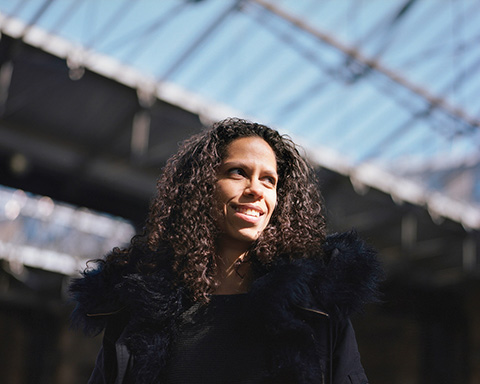When Aida Edemariam (MA 1996) was growing up in Addis Ababa, Ethiopia, her grandmother would regale family and friends with stories during the daily coffee ceremony – an Ethiopian ritual – at Edemariam’s home. As the coffee beans crackled in a pan over the fire, and the rich smell of freshly roasted coffee rose, Edemariam – in the manner of all clever children – sat silently to better eavesdrop. “Coffee was a forbidden thing for children, and I’d sit there and see how much I’d be allowed to get away with, and listen,” she says. Her grandmother, Yetemegnu, was a natural raconteur, and Edemariam began taping their conversations when she was in her 20s.
Edemariam captures her grandmother’s life in her first book, The Wife’s Tale: A Personal History. Yetemegnu lived until the age of 98, and her stories – those of a woman without political power – are often those lost to history. She talks of being married by the age of eight to a cleric 20 years her senior. (No one told her she was betrothed: “Why would anyone bother to tell a girl child?” writes Edemariam.) Of giving birth to the first of her nine children at the age of 14. Of physical violence at her husband’s hand – and of standing up to him when she was in her mid-20s. Of surviving civil war. “It’s a woman’s encounter with history. Women live war differently, and rarely does anyone tell it from their point of view,” says Edemariam. “I wanted to take a woman’s experience as seriously as somebody would tell the story of an emperor.”
The book was also a chance for Edemariam, a writer and editor for the Guardian newspaper in London, to revisit her own childhood. The daughter of two doctors – her mother is from Canada, and met her dad in Montreal while they were both medical students – Edemariam lived in Ethiopia until she was 15. After a stint at boarding school, she attended the University of Oxford and then earned a master’s degree in English from U of T. Edemariam came to the university because of her interest in the Romantics and poet Samuel Taylor Coleridge, whose papers reside at Victoria College. During her time in Toronto, Edemariam also discovered U of T alum Michael Ondaatje’s Running in the Family – his memoir of returning to his childhood home of Ceylon (now Sri Lanka). “He wrote, ‘In my mid-thirties, I realized I had slipped past a childhood I had ignored and not understood’ – and he wanted to go back to Sri Lanka to see what his childhood was,” says Edemariam. “I went back to write about my grandmother, but, quite late in the process, I realized I was doing something similar.”
Edemariam draws an expansive, full-bodied portrait of Ethiopia, detailing its landscape, people and 20th-century history – as it shifts radically from a deeply hierarchical country under emperorships, through a Marxist revolution, to an ostensible democracy in the ’90s. “People have very knee-jerk assumptions about Ethiopia. They assume wastelands and it’s not like that. It’s a very rich place,” she says, referencing the culture, language and scenic beauty.
Near the end of the book, Edemariam describes taking her then-two-year-old daughter to Ethiopia. Her daughter, too, watches coffee beans roasting in a pan over the fire and listens to the stories of her great-grandmother, then in her 90s. While Yetemegnu is frail and less talkative, her personality is still emotionally open. “When most people grow up, they almost grow a carapace to protect their feelings. She inhabited her feelings,” says Edemariam. “She was capable of unconditional love – which you don’t come across very often.”
Recent Posts
A Sentinel for Global Health
AI is promising a better – and faster – way to monitor the world for emerging medical threats
The Age of Deception
AI is generating a disinformation arms race. The window to stop it may be closing
Safety First
AI has developed faster than anyone thought. Will it serve humanity’s best interests?




